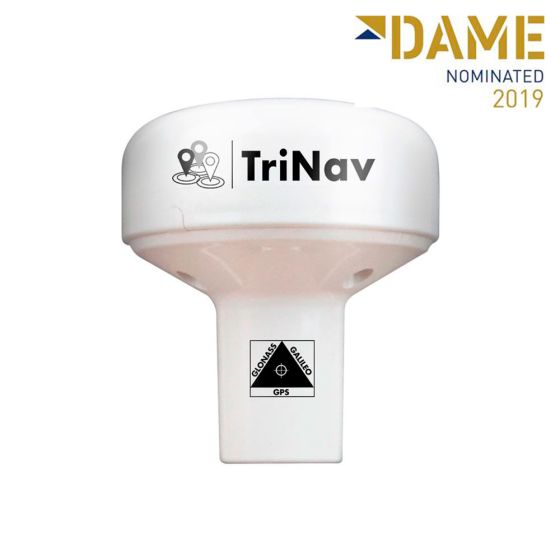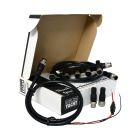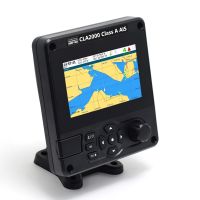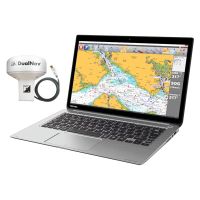Digital Yacht GPS160 TriNav GPS/Galileo/Glonass Sensor
The GPS160 supports GPS, Glonass and Galileo positioning. TriNav technology is used to combine signals from all three systems to compute the best possible fix accuracy and reliability.
Variations Available
- With NMEA0183 Output
- With USB Output
- With iKonvert NMEA2000 Interface Bundle
- With STN Seatalk Interface Bundle
- With WLN10SM Wireless Interface Bundle
- 72 channel GPS, Glonassand Galileo GNSS positioning receiver
- Typically sub 1m accuracy thanks to TriNavtechnology –combines all satellite data for optimum accuracy
- Can be configured as dedicated GPS, Glonassor Galileo only device
- Sophisticated anti-spoofing algorithm for robust positioning performance and interference rejection
- Available in NMEA 0183, NMEA 2000 (with iKonvertinterface)and wireless (with WLN10SM) variants
- GPS160USB also available with USB connection for PC/MAC
- User/field selectable 4800, 38400 and 115200 baud operation through simple internal DIP switches
- Multiple formats of NMEA data output including datum information –user configurable through internal DIP switches
- Up to 18Hz update rate (user selectable)
- Ultra low (<20mA) power consumption at 12V DC
- Input for MOB switch/system –when activated generates synthetic AIS MOB NMEA output to activate MOB position on plotter
- Datum mode support for professional ECDIS systems
- Puck installation or fits 3rdparty industry standard 1” x 14TPI threaded mount
What is Galileo?
Galileo is the new global navigation satellite system (GNSS) that has been developed over the past two decades. It joins the GPS and GLONASS systems and offers mariners a 3rdreliable positioning source. It is planned to be fully operational in 2020.
The EU funded €10 billion project is named after the Italian astronomer Galileo Galilei. One of the aims of Galileo is to provide an independent high-precision positioning system so European nations do not have to rely on the U.S. GPS or the Russian GLONASS systems which could be disabled or degraded by their operators at any time. The use of basic Galileo services will be free and open to everyone. Galileo is intended to provide horizontal and vertical position measurements within 1m precision and better positioning services at higher latitudes than other positioning systems. Galileo will also provide a new global search and rescue (SAR) function as part of the MEOSAR system enabling an acknowledgement signal for EPIRBs of a distress signal received.
There are currently 22 satellites in usable condition (operational and contributing to the service provision), 2 satellites are in "testing" and 2 more are marked as not available. The final constellation should be deployed by 2020 and will consist of 30 satellites (24 operational and 6 spares).
Variations Available
GPS160 TriNav Sensor with NMEA0183 Output (144-GPS160)
The GPS160 has a standard NMEA 0183 output for connection to plotters, instruments and systems
GPS 160 TriNav Sensor with USB Output (144-GPS160USB)
The GPS160USB variant ships with a 5m cable. It’s self powered from the USB source (PC, MAC or Linux). When installed, a virtual COM port is created on the host PC so navigation programs can receive positioning data.
If a longer cable is required, it’s best to utilise the GPS160 (standard NMEA version) with a USB-NMEA adaptor cable.
GPS160 Plus iKonvert NMEA2000 Interface Bundle (144-GPS160N2K)
For NMEA 2000 systems utilise the iKonvertgateway which allows an easy and thin cable to be run from the GPS160 to the nearest point on the NMEA 2000 backbone for the iKonvert to connect to.
GPS160 Plus STN Seatalk Interface Bundle (144-GPS160ST)
For legacy SeaTalk 1 systems, this bundle offers the SeaTalk to NMEA adaptor allowing easy replacement of older Raystarsensors
GPS160 Plus WLN10SM Wireless Interface Bundle (144-GPS160WL)
For wireless navigation with tablets and iPads, use the WLN10SM NMEA to wifigateway.







